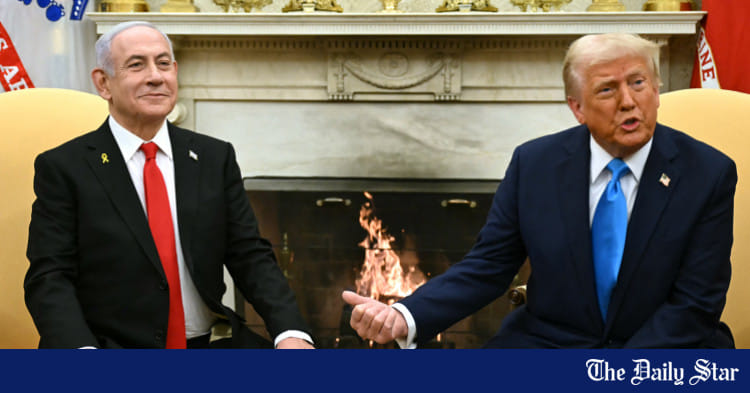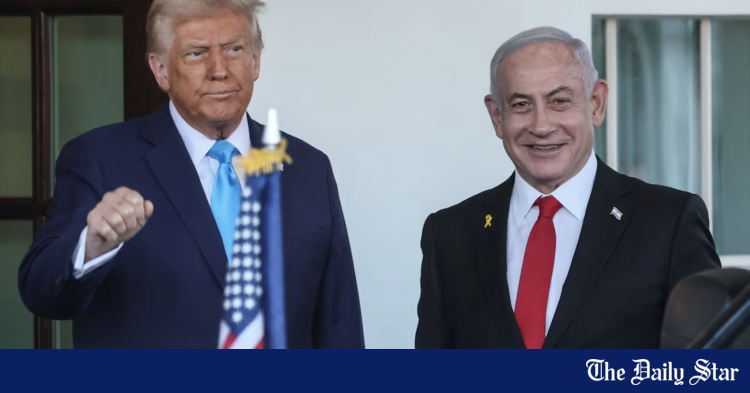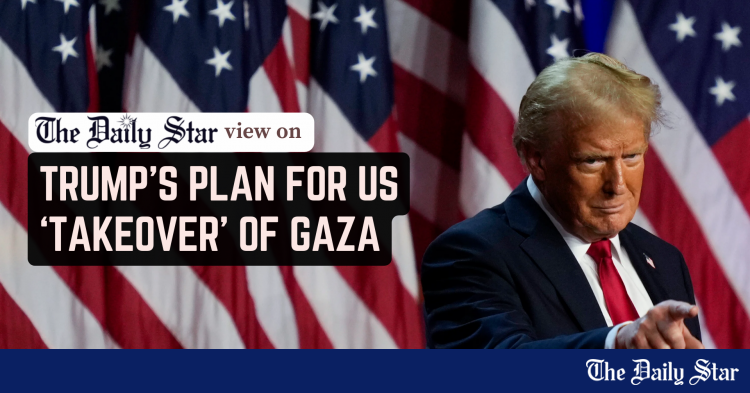Saif
Senior Operative
- 13,242
- 7,264
- Origin

- Axis Group

- Copy to clipboard
- Thread starter
- #521

Trump says US will take over Gaza, create 'Riviera of the Middle East'
He made the stunning proposal to audible gasps during a joint press conference with Netanyahu
Trump says US will take over Gaza, create 'Riviera of the Middle East'

US President Donald Trump (R) meets with Israel's Prime Minister Benjamin Netanyahu in the Oval Office of the White House in Washington, DC, on February 4, 2025. Photo: AFP
President Donald Trump revealed a plan on Tuesday for the United States to take over the Gaza Strip, resettle Palestinians in other countries -- seemingly whether they wanted to leave or not -- and turn the territory into "the Riviera of the Middle East."
Trump made the stunning proposal to audible gasps during a joint press conference with Israeli Prime Minister Benjamin Netanyahu, whom he was hosting at the White House for talks.
In a scheme that lacked details on how he would move out more than two million Palestinians or control Gaza, Trump said he would make the war-battered enclave "unbelievable" by removing unexploded bombs and rubble and economically redeveloping it.
"The US will take over the Gaza Strip and we will do a job with it, too. We'll own it," Trump said.
He said there was support from the "highest leadership" in the Middle East and upped pressure on Egypt and Jordan to take displaced Gazans -- despite both countries and the Palestinians flatly rejecting the surprise idea.
Suggesting "long-term ownership" by the United States, Trump said his plan for Gaza would make it "the Riviera of the Middle East. This could be something that could be so magnificent."
Key US ally Netanyahu said Trump's plan could "change history" and was worth "paying attention to."
Netanyahu was making the first visit of a foreign leader to the White House since Trump's return to power, for what were billed as talks on securing a second phase of the Israel-Hamas truce after an initial six-week ceasefire.
'Miserable existence'
But it quickly turned into the shock revelation of a plan that would completely transform the face of the Middle East.
Trump, who also floated traveling to Gaza, appeared to suggest it would not be rebuilt for Palestinians.
"It should not go through a process of rebuilding and occupation by the same people that have... lived there and died there and lived a miserable existence there," he said.
The Palestinian envoy to the UN had pushed back strongly at Trump's suggestions earlier Tuesday -- before his proposal the United States take the territory over -- for his people to be resettled.
"Our homeland is our homeland," said Riyad Mansour.
"And I think that leaders and people should respect the wishes of the Palestinian people."
Gazans have also denounced Trump's resettlement idea. "Trump thinks Gaza is a pile of garbage -- absolutely not," said 34-year-old Hatem Azzam, a resident of the southern city of Rafah.
Trump was vague on the details of how he would execute the takeover plan, but hinted that it could require US boots on the ground in one of the most volatile places on earth "if necessary."
It is not the first time the former property tycoon has spoken about the Palestinian territory in terms of real estate, saying in October it could be "better than Monaco."
Standing at a podium beside Trump, Netanyahu hailed Trump as Israel's "greatest friend" and praised his "willingness to think outside the box."
The two have had tense relations in the past, but Netanyahu has seized on the Republican's return to power after his ties with former president Joe Biden became increasingly strained over the death toll in Gaza since Israel's invasion.
'Winning the war'
The Israeli leader would not rule out a return to hostilities with Hamas, or with its other foes in the region including Lebanon's Hezbollah and Iran.
"We will end the war by winning the war," Netanyahu insisted, while also vowing to secure the return of all hostages held by Hamas.
He did voice confidence that a deal with regional rival Saudi Arabia to normalize relations was "going to happen."
But after Trump aired his proposal, Saudi Arabia said it would not formalize ties with Israel unless a Palestinian state is established.
Trump's grand Gaza plan however is set to face harsh opposition from Palestinians and Middle Eastern countries.
Egypt, Jordan and ceasefire mediator Qatar have all flatly rejected Trump's suggestion of moving Palestinians from Gaza.
The war began when Hamas attacked Israel on October 7, 2023, taking into Gaza 251 hostages, 76 of whom are still held in the Palestinian territory including 34 the Israeli military says are dead.
Hamas's attack resulted in the deaths of 1,210 people on Israeli side, mostly civilians, according to an AFP tally based on official Israeli figures.
Israel's retaliatory response has killed at least 47,518 people in Gaza, the majority civilians, according to the Hamas-run territory's health ministry. The UN considers these figures as reliable.
The truce that took effect on January 18 has led to a surge of food, fuel, medical and other aid into Gaza, and allowed people displaced by the war to return to the north of the Palestinian territory.
But since the Gaza ceasefire took effect, Israel has launched a deadly operation against militants in the occupied West Bank's north.
US President Donald Trump (R) meets with Israel's Prime Minister Benjamin Netanyahu in the Oval Office of the White House in Washington, DC, on February 4, 2025. Photo: AFP
President Donald Trump revealed a plan on Tuesday for the United States to take over the Gaza Strip, resettle Palestinians in other countries -- seemingly whether they wanted to leave or not -- and turn the territory into "the Riviera of the Middle East."
Trump made the stunning proposal to audible gasps during a joint press conference with Israeli Prime Minister Benjamin Netanyahu, whom he was hosting at the White House for talks.
In a scheme that lacked details on how he would move out more than two million Palestinians or control Gaza, Trump said he would make the war-battered enclave "unbelievable" by removing unexploded bombs and rubble and economically redeveloping it.
"The US will take over the Gaza Strip and we will do a job with it, too. We'll own it," Trump said.
He said there was support from the "highest leadership" in the Middle East and upped pressure on Egypt and Jordan to take displaced Gazans -- despite both countries and the Palestinians flatly rejecting the surprise idea.
Suggesting "long-term ownership" by the United States, Trump said his plan for Gaza would make it "the Riviera of the Middle East. This could be something that could be so magnificent."
Key US ally Netanyahu said Trump's plan could "change history" and was worth "paying attention to."
Netanyahu was making the first visit of a foreign leader to the White House since Trump's return to power, for what were billed as talks on securing a second phase of the Israel-Hamas truce after an initial six-week ceasefire.
'Miserable existence'
But it quickly turned into the shock revelation of a plan that would completely transform the face of the Middle East.
Trump, who also floated traveling to Gaza, appeared to suggest it would not be rebuilt for Palestinians.
"It should not go through a process of rebuilding and occupation by the same people that have... lived there and died there and lived a miserable existence there," he said.
The Palestinian envoy to the UN had pushed back strongly at Trump's suggestions earlier Tuesday -- before his proposal the United States take the territory over -- for his people to be resettled.
"Our homeland is our homeland," said Riyad Mansour.
"And I think that leaders and people should respect the wishes of the Palestinian people."
Gazans have also denounced Trump's resettlement idea. "Trump thinks Gaza is a pile of garbage -- absolutely not," said 34-year-old Hatem Azzam, a resident of the southern city of Rafah.
Trump was vague on the details of how he would execute the takeover plan, but hinted that it could require US boots on the ground in one of the most volatile places on earth "if necessary."
It is not the first time the former property tycoon has spoken about the Palestinian territory in terms of real estate, saying in October it could be "better than Monaco."
Standing at a podium beside Trump, Netanyahu hailed Trump as Israel's "greatest friend" and praised his "willingness to think outside the box."
The two have had tense relations in the past, but Netanyahu has seized on the Republican's return to power after his ties with former president Joe Biden became increasingly strained over the death toll in Gaza since Israel's invasion.
'Winning the war'
The Israeli leader would not rule out a return to hostilities with Hamas, or with its other foes in the region including Lebanon's Hezbollah and Iran.
"We will end the war by winning the war," Netanyahu insisted, while also vowing to secure the return of all hostages held by Hamas.
He did voice confidence that a deal with regional rival Saudi Arabia to normalize relations was "going to happen."
But after Trump aired his proposal, Saudi Arabia said it would not formalize ties with Israel unless a Palestinian state is established.
Trump's grand Gaza plan however is set to face harsh opposition from Palestinians and Middle Eastern countries.
Egypt, Jordan and ceasefire mediator Qatar have all flatly rejected Trump's suggestion of moving Palestinians from Gaza.
The war began when Hamas attacked Israel on October 7, 2023, taking into Gaza 251 hostages, 76 of whom are still held in the Palestinian territory including 34 the Israeli military says are dead.
Hamas's attack resulted in the deaths of 1,210 people on Israeli side, mostly civilians, according to an AFP tally based on official Israeli figures.
Israel's retaliatory response has killed at least 47,518 people in Gaza, the majority civilians, according to the Hamas-run territory's health ministry. The UN considers these figures as reliable.
The truce that took effect on January 18 has led to a surge of food, fuel, medical and other aid into Gaza, and allowed people displaced by the war to return to the north of the Palestinian territory.
But since the Gaza ceasefire took effect, Israel has launched a deadly operation against militants in the occupied West Bank's north.







